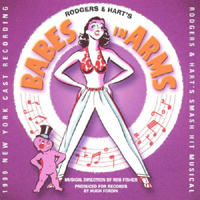 Original Cast, 1976 (Take Home Tunes)
Original Cast, 1976 (Take Home Tunes)  (5 / 5) This beautiful cast album continues to mystify listeners as to why The Baker’s Wife was a huge flop. Based on the play and subsequent film La femme du boulanger by Marcel Pagnol and Jean Giono, the musical’s book is by Joseph Stein, with music and lyrics by Stephen Schwartz. The fable is set in long-ago provincial France, where a middle-aged baker’s young wife leaves him for a torrid affair with a handsome young villager. The show closed on the road to Broadway; most of the cast and creative-team members were replaced during its lengthy tryout tour. When it finally shuttered in Washington, the leads were Paul Sorvino, whose semi-operatic voice sounds great in the songs of Aimable, the baker, on this abridged recording score; Patti LuPone as his wife, Genevieve, belting to high heaven when she has to, but wonderfully warm in the more lyrical passages of the score; Kurt Peterson, appropriately sexy as her young lover, Dominique; and Teri Ralston as Denise, a village woman who gets to sing the lilting “Chanson” in her silvery soprano. All ten songs sung by the principals are superb, from character-establishing numbers like “Merci, Madame” to ravishing ballads like “Endless Delights.” Other highlights include “Gifts of Love,” a gorgeous and poignant piece in which Genevieve resigns herself to a marriage that’s based on companionship rather than passion; “Meadowlark,” the magnificent story-song that the baker’s wife belts out when deciding to go off with her young stud; and “Proud Lady,” sung by the strutting peacock Dominique. Schwartz’s score differs impressively from the style of his monster hits Godspell and Pippin, and the recording boasts lovely orchestrations. — Michael Portantiere
(5 / 5) This beautiful cast album continues to mystify listeners as to why The Baker’s Wife was a huge flop. Based on the play and subsequent film La femme du boulanger by Marcel Pagnol and Jean Giono, the musical’s book is by Joseph Stein, with music and lyrics by Stephen Schwartz. The fable is set in long-ago provincial France, where a middle-aged baker’s young wife leaves him for a torrid affair with a handsome young villager. The show closed on the road to Broadway; most of the cast and creative-team members were replaced during its lengthy tryout tour. When it finally shuttered in Washington, the leads were Paul Sorvino, whose semi-operatic voice sounds great in the songs of Aimable, the baker, on this abridged recording score; Patti LuPone as his wife, Genevieve, belting to high heaven when she has to, but wonderfully warm in the more lyrical passages of the score; Kurt Peterson, appropriately sexy as her young lover, Dominique; and Teri Ralston as Denise, a village woman who gets to sing the lilting “Chanson” in her silvery soprano. All ten songs sung by the principals are superb, from character-establishing numbers like “Merci, Madame” to ravishing ballads like “Endless Delights.” Other highlights include “Gifts of Love,” a gorgeous and poignant piece in which Genevieve resigns herself to a marriage that’s based on companionship rather than passion; “Meadowlark,” the magnificent story-song that the baker’s wife belts out when deciding to go off with her young stud; and “Proud Lady,” sung by the strutting peacock Dominique. Schwartz’s score differs impressively from the style of his monster hits Godspell and Pippin, and the recording boasts lovely orchestrations. — Michael Portantiere
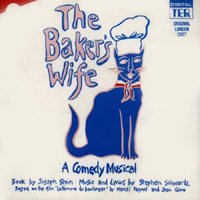 Original London Cast, 1990 (JAY, 2CDs)
Original London Cast, 1990 (JAY, 2CDs)  (1 / 5) Even as musical theater completists appreciate the fact that a high-profile London production of The Baker’s Wife yielded this much lengthier recording of the score, it must be said that the results are unpersuasive in terms of both text and performance. Directed by Trevor Nunn, this version has some new Stephen Schwartz songs, along with several that were in the original production but not previously recorded. Still, the two-CD album is disconcerting. First of all, as presented here, the songs carried over from the earlier recording have many unfamiliar lyrics; Schwartz has a penchant for tinkering with his own work after the fact, but it’s hard to understand the point of such revisions when the new lyrics don’t represent an improvement over the originals. In “Chanson,” for example, we now hear lyrics about gulls crying rather than sheep bleating. Was this change necessary? Severely truncated as the original recording is, it’s sad to report that the new/old songs included on the JAY recording aren’t very interesting. Many of them involve the villagers gossiping about the Aimable-Genevieve-Dominique affair (although, here, the young man’s name is spelled “Dominic”). As for the leading players: Alun Armstrong’s attempt to compensate for his substandard singing voice with fine acting isn’t successful. He also sings the baker’s songs in much lower keys than Paul Sorvino’s, and the results are dispiriting. The plum role of Genevieve is filled by Shar Lee Hill, who is…no Patti LuPone. As Dominic, Drue Williams sings poorly and sounds effeminate, which certainly doesn’t work for this character. Jill Martin displays the best voice of all the London principals in Denise’s “Chanson,” but here again, the song is performed in a considerably lower key than on the American cast album, and is therefore far less effective. — M.P.
(1 / 5) Even as musical theater completists appreciate the fact that a high-profile London production of The Baker’s Wife yielded this much lengthier recording of the score, it must be said that the results are unpersuasive in terms of both text and performance. Directed by Trevor Nunn, this version has some new Stephen Schwartz songs, along with several that were in the original production but not previously recorded. Still, the two-CD album is disconcerting. First of all, as presented here, the songs carried over from the earlier recording have many unfamiliar lyrics; Schwartz has a penchant for tinkering with his own work after the fact, but it’s hard to understand the point of such revisions when the new lyrics don’t represent an improvement over the originals. In “Chanson,” for example, we now hear lyrics about gulls crying rather than sheep bleating. Was this change necessary? Severely truncated as the original recording is, it’s sad to report that the new/old songs included on the JAY recording aren’t very interesting. Many of them involve the villagers gossiping about the Aimable-Genevieve-Dominique affair (although, here, the young man’s name is spelled “Dominic”). As for the leading players: Alun Armstrong’s attempt to compensate for his substandard singing voice with fine acting isn’t successful. He also sings the baker’s songs in much lower keys than Paul Sorvino’s, and the results are dispiriting. The plum role of Genevieve is filled by Shar Lee Hill, who is…no Patti LuPone. As Dominic, Drue Williams sings poorly and sounds effeminate, which certainly doesn’t work for this character. Jill Martin displays the best voice of all the London principals in Denise’s “Chanson,” but here again, the song is performed in a considerably lower key than on the American cast album, and is therefore far less effective. — M.P.


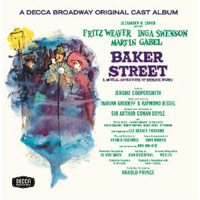
 (2 / 5) One of the last in the cycle of My Fair Lady wannabes, Baker Street is complete with handsome Victorian settings, a misogynistic hero (Sherlock Holmes), and a Cockney chorus high-kicking all over London. The problem was that songwriters Marian Grudeff and Raymond Jessel emphatically were not Lerner and Loewe, not even with Bock and Harnick ghostwriting three numbers (”I’m in London Again,” “Cold Clear World,” and “I Shall Miss You”) during the troubled tryout period. The melodic lines are facile, the lyrics occasionally intricate — as in the ironically named “It’s So Simple” — yet it’s all on the surface. As Holmes, Fritz Weaver is fine, but he can’t make anything memorable of the material. His leading lady, Inga Swenson, by all accounts impressive onstage, doesn’t come across on this recording. Even the old-fashioned, three-part, would-be showstopper “Letters” lands with a thud. Martin Gabel as Moriarty, Peter Sallis as Watson, and Teddy Green as a leading Baker Street Irregular round out the cast; they all work hard, but in vain. Although the album is well designed, with color photos and a verbose synopsis, it never convinces you that this was “the hottest musical of 1965.” It’s worth noting that an even shorter-lived show from that year, Drat! The Cat!, had one throwaway number in it (“Holmes and Watson”) that encapsulated what was special about the duo better than this entire score. — Marc Miller
(2 / 5) One of the last in the cycle of My Fair Lady wannabes, Baker Street is complete with handsome Victorian settings, a misogynistic hero (Sherlock Holmes), and a Cockney chorus high-kicking all over London. The problem was that songwriters Marian Grudeff and Raymond Jessel emphatically were not Lerner and Loewe, not even with Bock and Harnick ghostwriting three numbers (”I’m in London Again,” “Cold Clear World,” and “I Shall Miss You”) during the troubled tryout period. The melodic lines are facile, the lyrics occasionally intricate — as in the ironically named “It’s So Simple” — yet it’s all on the surface. As Holmes, Fritz Weaver is fine, but he can’t make anything memorable of the material. His leading lady, Inga Swenson, by all accounts impressive onstage, doesn’t come across on this recording. Even the old-fashioned, three-part, would-be showstopper “Letters” lands with a thud. Martin Gabel as Moriarty, Peter Sallis as Watson, and Teddy Green as a leading Baker Street Irregular round out the cast; they all work hard, but in vain. Although the album is well designed, with color photos and a verbose synopsis, it never convinces you that this was “the hottest musical of 1965.” It’s worth noting that an even shorter-lived show from that year, Drat! The Cat!, had one throwaway number in it (“Holmes and Watson”) that encapsulated what was special about the duo better than this entire score. — Marc Miller 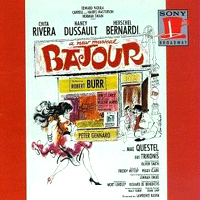

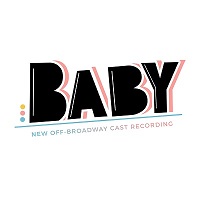
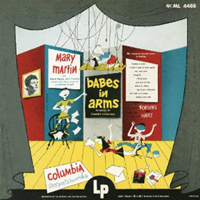
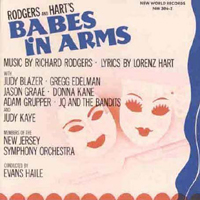
 (4 / 5) Now, this is more like it: a nearly complete recording with restored Hans Spialek orchestrations, all the ballet music (Babes in Arms was a George Balanchine show), and Evans Haile energetically conducting the New Jersey Symphony Orchestra. All that’s missing is the now-unacceptable “All Dark People,” written by R&H as a specialty for the Nicholas Brothers. Although the ballet music isn’t all that interesting, the orchestrations are terrific, from the pearly celesta in “My Funny Valentine” to the twangs and woodwinds in “Way Out West.” There’s also some spiffy close-harmony work from the guy group JQ and the Bandits. While the casting is vocally deluxe, Judy Blazer, Gregg Edelman, Judy Kaye, and Jason Graae aren’t convincing age-wise as the needy teen offspring of down-on-their-luck vaudevillians. But it would be hard to top Blazer’s reading of “My Funny Valentine,” Kaye’s sarcasm in “Imagine,” or the sheer joy of the title song. It makes you want to go paint a barn, wheel the piano in, and start the auditions! — M.M.
(4 / 5) Now, this is more like it: a nearly complete recording with restored Hans Spialek orchestrations, all the ballet music (Babes in Arms was a George Balanchine show), and Evans Haile energetically conducting the New Jersey Symphony Orchestra. All that’s missing is the now-unacceptable “All Dark People,” written by R&H as a specialty for the Nicholas Brothers. Although the ballet music isn’t all that interesting, the orchestrations are terrific, from the pearly celesta in “My Funny Valentine” to the twangs and woodwinds in “Way Out West.” There’s also some spiffy close-harmony work from the guy group JQ and the Bandits. While the casting is vocally deluxe, Judy Blazer, Gregg Edelman, Judy Kaye, and Jason Graae aren’t convincing age-wise as the needy teen offspring of down-on-their-luck vaudevillians. But it would be hard to top Blazer’s reading of “My Funny Valentine,” Kaye’s sarcasm in “Imagine,” or the sheer joy of the title song. It makes you want to go paint a barn, wheel the piano in, and start the auditions! — M.M.